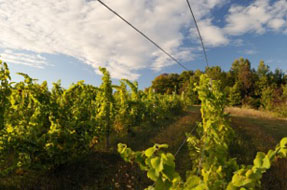Researchers Receive $2.5 million for Cold Hardy Grape Project
New grape varieties can take more than 20 years to breed and evaluate, and much longer to reach commercial success. A $2.5 million grant will help a team of researchers from Nebraska to New York tackle obstacles in vineyard, winery, tasting room, and tourism to bring cold hardy grapes to a wider market.
The focus of the grant is a group of extremely hardy cold climate grapes varieties, new to both growers and consumers, which have spawned new small-winery industries in the upper Midwest and Northeast over the past decade.
The challenges ahead include determining the best growing conditions, how to modify their higher acidity and showcase their aroma, and how to build tourism networks to draw visitors to tasting rooms, where a majority of sales take place.
‘These varieties are unique. Practices that producers use to grow and make Riesling and Merlot won’t work for these varieties, due to differences in their genetic background and fruit chemistry,” said Tim Martinson, project director and senior extension associate at Cornell. ‘Producers of newer varietals–like Marquette, Frontenac and Brianna – face additional challenges in establishing markets to promote and sell these wines.
Their goal is to provide producers with research-based tools and practices to help them grow, vinify, and sell quality wines to local and regional markets.
‘We’ve put together an interdisciplinary team of vineyard scientists, enologists, and marketing experts to address these challenges across 12 states,” said Martinson. ‘Working as a team, we hope to be able to offer integrated, relevant information that would not be possible with individual state-based teams working independently.”
The consortium includes researchers from Cornell University, Iowa State University, Michigan State University, Oklahoma State University, North Dakota State University, South Dakota State University, the Connecticut Agricultural Experiment Station and the Universities of Illinois, Massachusetts (Amherst), Minnesota, Nebraska, Vermont, and Wisconsin.
Ultimately, they hope the project will help convert startup wineries into sustainably profitable enterprises that can fuel rural economic development.
The grant was funded by the by the USDA National Institute of Food and Agriculture Specialty Crop Research Initiative (SCRI), which supports multi-institution, interdisciplinary research on crops including fruits, vegetables, tree nuts, and ornamentals.
Additional info: USDA- NIFA Newsroom article:
http://www.nifa.usda.gov/newsroom/news/2011news/10141_scri.html
This article first appeared in the October 14, 2011 issue of Wine Grower News and is reprinted by permission of the Midwest Grape and Wine Industry Institute at Iowa State University. Please visit the Midwest Grape and Wine Institute website at www.extension.iastate.edu/Wine/ for extensive information regarding cold hardy grapes.



